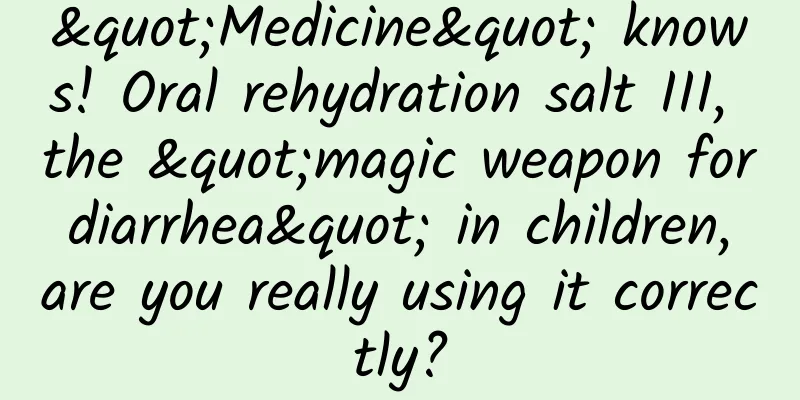"Medicine" knows! Oral rehydration salt III, the "magic weapon for diarrhea" in children, are you really using it correctly?

|
June to August and October to December each year are the two peak periods for acute infectious diarrhea in children. Experts from Taoyuan County Traditional Chinese Medicine Hospital said that the main harm of diarrhea is dehydration, which is the main cause of death caused by diarrhea, especially in children, who have a large demand for water and unstable extracellular fluid levels, making them prone to dehydration. Once dehydration occurs, it will cause a large loss of water and electrolytes. Some will experience hypovolemic shock, and even be life-threatening. Therefore, domestic and international guidelines point out that the primary principle of diarrhea treatment is to prevent and treat dehydration, requiring the use of oral rehydration salts III for rehydration therapy from the beginning. Oral rehydration salts III are beneficial for transporting water and electrolytes into the blood circulation, which can quickly correct the body's dehydration state. At the same time, it can reduce the amount of stool, the number of diarrhea times and the duration of diarrhea, improve the effect of diarrhea treatment, and effectively reduce the risk of adverse reactions. It is a safe, economical and effective method for treating diarrhea. 1. How to prepare Oral Rehydration Salt III? The steps for preparing oral rehydration salt III are as follows: 1. Observe the scale on the cup that comes with the medicine and add 250ml of warm water at one time; 2. Add a whole packet of oral rehydration salt III at one time; 3. Stir to dissolve thoroughly and take in divided doses as needed. 2. How much should you supplement after each diarrhea? Case 1: No symptoms of dehydration From the beginning of the diarrhea, give the child enough fluids by mouth to prevent dehydration, give oral rehydration salts, and give a certain amount of fluid after each loose stool: ①<6 months: 50ml each time; ②6 months to 2 years old: 100ml each time; ③2-10 years old: 150ml each time; ④ Patients over 10 years old can take the medicine at will until the diarrhea stops. Situation 2: Mild to moderate dehydration Symptoms of mild to moderate dehydration: dry lips, thirst, decreased urination, listlessness, few or no tears when crying, sunken eye sockets, etc. Dose (ml) = body weight (kg) × 50ml/kg, take within 4 hours. If dehydration is corrected after 4 hours, continue taking the dose for preventing dehydration in "Case 1" until diarrhea stops. For example: an 18-month-old child with diarrhea, weighing 10kg, with mild dehydration, should use a dosage of 10 kg×50ml/kg = 500ml (i.e. 2 bags), i.e. 500ml should be fed within 4 hours. If the dehydration has been corrected thereafter, then supplement according to the dosage for "Case 1" without dehydration symptoms, i.e. 100ml should be taken after each loose stool until the diarrhea stops. Situation 3: Severe dehydration Symptoms of severe dehydration: apathy, coma, refusal to drink water, sunken eye sockets, etc. Patients with severe dehydration need to be sent to the hospital for emergency treatment immediately. First, intravenous rehydration should be used. After the severe dehydration is corrected, oral rehydration salts III can be used until the diarrhea stops. 3. What should I do if the child cannot finish the required dose? To prevent dehydration and ensure therapeutic effects, children should be fed sufficient doses from the beginning of their diarrhea. However, parents often report that younger babies do not comply well and cannot drink the required dose at one time. We recommend that parents use a spoon, dropper or small cup to feed the child in small amounts and multiple times, every 3 to 5 minutes, 10 to 20 ml each time, until the required dose is reached. If the child vomits, you can stop for 5 to 10 minutes and then feed slowly. 4. Young children cannot drink so much at one time. Can half a bag of oral rehydration salt III be mixed with 125ml of water? Because Oral Rehydration Salt III is a compound preparation, adding 250 ml of warm water will prepare a solution with a total osmotic pressure of 245 mOsm/L. This hypotonic formula is more suitable for children to prevent dehydration and replenish fluids for mild to moderate dehydration. If parents only use "visual inspection" to divide out half a bag of this precise formula, it will definitely affect the concentration and osmotic pressure of the final prepared solution, and thus affect the rehydration effect. Therefore, the correct way is to mix a bag of oral rehydration salt III into 250ml of warm boiled water and take it in divided doses. 5. If the oral rehydration salt III cools down after being left out, can hot water be added directly? When the temperature is constant, the osmotic pressure of a dilute solution is proportional to the concentration of the solution. Therefore, adding hot water directly to oral rehydration salt III will lower the concentration of oral rehydration salt, which will cause the osmotic pressure of the solution to become even lower. At the same time, the amount of electrolytes cannot be controlled, affecting the rehydration effect. Therefore, we recommend that parents warm the cup of oral rehydration salts in a water bath just like they would warm milk. 6. If I prepare 250ml at a time and cannot finish it, can I save it for tomorrow? It is not recommended to store the prepared oral rehydration salt III for a long time. The unused oral rehydration salt solution should be stored in the refrigerator and discarded after 24 hours. Because the environment, saliva, and food can cause oral rehydration salts III to become contaminated and even breed bacteria and deteriorate, we recommend that when taking oral rehydration salts, you can transfer from the prepared large cup to a small cup to avoid contamination. It is recommended that the cup containing oral rehydration salts be covered and stored in the refrigerator. 7. Can it be mixed with milk and juice? Because milk and fruit juice also contain salt, sugar, potassium and other ingredients, using these beverages to prepare oral rehydration salts will change the amount of electrolytes and affect the rehydration effect. From another perspective, using milk and fruit juice to prepare oral rehydration salts will make it easier for bacteria and other microorganisms to grow if left for a long time, so it is not recommended to add it to milk or juice when taken. 8. Do I need to drink boiled water while taking oral rehydration salts? According to Pediatrics (8th edition), the daily water requirement for children is as follows: The amount of oral rehydration salts used cannot meet the daily water needs of children, so it is recommended that if the child's condition permits, they should eat normally in addition to taking oral rehydration salts. 9. What situations indicate that oral rehydration has failed? 1. Continuous, frequent, and massive diarrhea: >10-20 ml/kg/h; 2. Insufficient oral rehydration salt intake due to the child's non-cooperation or vomiting; 3. Frequent and severe vomiting, and the child shows signs of dehydration, such as restlessness, irritability, dry lips, sunken eye sockets, decreased urine volume, etc., and needs to be sent to the hospital immediately. Hunan Medical Chat Special Author: Yu Yi, Pharmacy Department, Taoyuan County Traditional Chinese Medicine Hospital Follow @湖南医聊 to get more health science information! (Edited by YT) |
<<: Is diarrhea a major cause of death among children? Keep these four medicines at home!
>>: How to maintain the stomach in autumn and winter
Recommend
Will there be needle-like pain in the lower right abdomen during early pregnancy?
For many female friends, pregnancy itself is a ve...
Why do I get stretch marks on my face during pregnancy?
Many women know that pregnancy is a very difficul...
Is the period right after a woman’s menstruation a safe period?
Women of childbearing age must pay attention to t...
What should a woman do if she has a headache after washing her head?
Hair should not be cleaned too frequently, otherw...
Menstruation is delayed for one day and the test is one line
Delayed menstruation is a common situation for ma...
Itchy red bumps on lower body
I believe many women have a certain understanding...
Picture of fetus in the womb
During the ten months of pregnancy, the fetus is ...
What is female uterine prolapse?
You can only understand the hard work of your mot...
What to do if you don’t ovulate? How to induce ovulation?
For women who want to add a child to their family...
Cancer experts warn: If these words appear in your medical report, it may be cancer! But...
Nowadays, everyone attaches great importance to p...
Numbness in women's hands and feet_What disease is it
I believe many people have experienced the phenom...
The developmental stages of girls
I believe that many women now love beauty very mu...
Can diabetics eat fresh hawthorn? How effective is hawthorn in lowering blood pressure?
Fresh hawthorn is a sour and sweet fruit. Fresh h...
What should I check for my second child?
Having a second child is no longer new, as many p...
Why do people eat grapefruit in winter? Can you eat grapefruit during menstruation?
Grapefruit is a very good fruit, and many friends...









